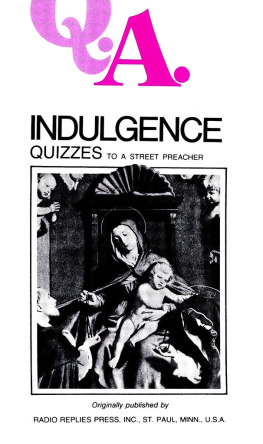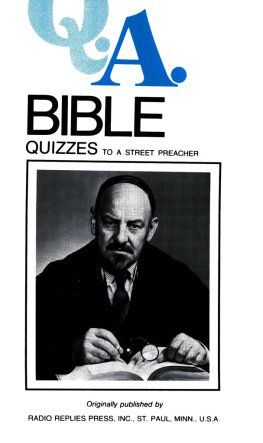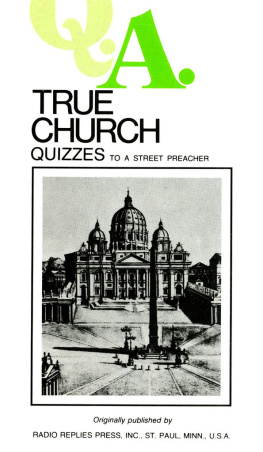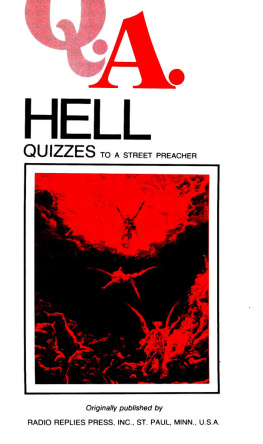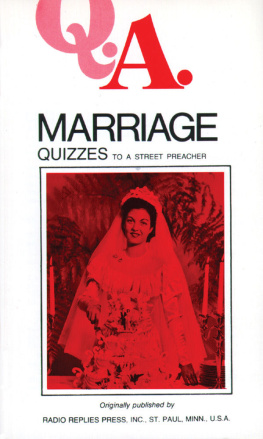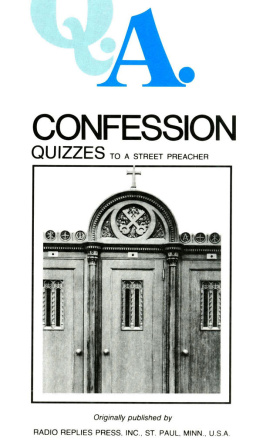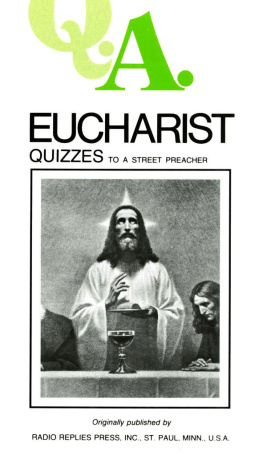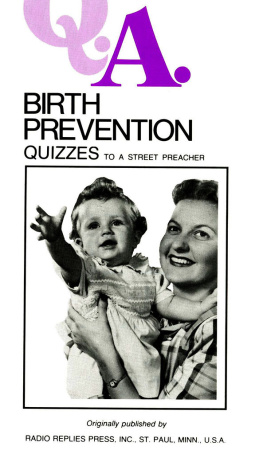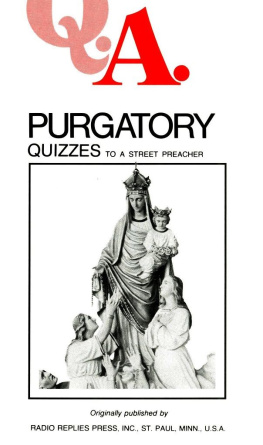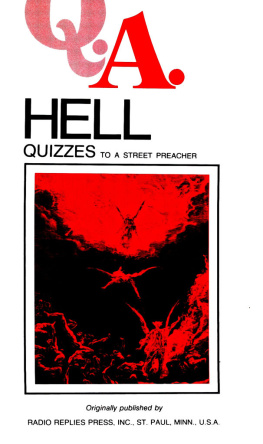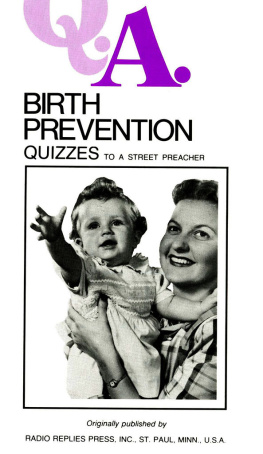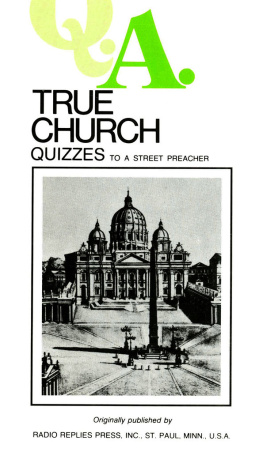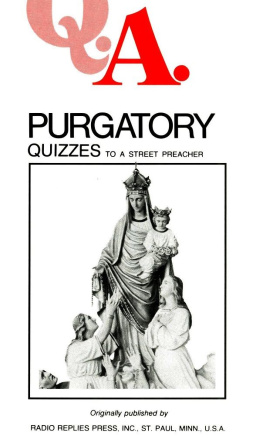Fr. Chas. M. Carty - Indulgence Quizzes: Quizzes to a Street Preacher
Here you can read online Fr. Chas. M. Carty - Indulgence Quizzes: Quizzes to a Street Preacher full text of the book (entire story) in english for free. Download pdf and epub, get meaning, cover and reviews about this ebook. year: 2015, publisher: TAN Books, genre: Religion. Description of the work, (preface) as well as reviews are available. Best literature library LitArk.com created for fans of good reading and offers a wide selection of genres:
Romance novel
Science fiction
Adventure
Detective
Science
History
Home and family
Prose
Art
Politics
Computer
Non-fiction
Religion
Business
Children
Humor
Choose a favorite category and find really read worthwhile books. Enjoy immersion in the world of imagination, feel the emotions of the characters or learn something new for yourself, make an fascinating discovery.
- Book:Indulgence Quizzes: Quizzes to a Street Preacher
- Author:
- Publisher:TAN Books
- Genre:
- Year:2015
- Rating:3 / 5
- Favourites:Add to favourites
- Your mark:
- 60
- 1
- 2
- 3
- 4
- 5
Indulgence Quizzes: Quizzes to a Street Preacher: summary, description and annotation
We offer to read an annotation, description, summary or preface (depends on what the author of the book "Indulgence Quizzes: Quizzes to a Street Preacher" wrote himself). If you haven't found the necessary information about the book — write in the comments, we will try to find it.
Fr. Chas. M. Carty: author's other books
Who wrote Indulgence Quizzes: Quizzes to a Street Preacher? Find out the surname, the name of the author of the book and a list of all author's works by series.
Indulgence Quizzes: Quizzes to a Street Preacher — read online for free the complete book (whole text) full work
Below is the text of the book, divided by pages. System saving the place of the last page read, allows you to conveniently read the book "Indulgence Quizzes: Quizzes to a Street Preacher" online for free, without having to search again every time where you left off. Put a bookmark, and you can go to the page where you finished reading at any time.
Font size:
Interval:
Bookmark:
Indulgence Quizzes
to a Street Preacher
Fr. Chas. M. Carty
&
Rev. Dr. L. Rumble, M.S.C.
Archiepiscopus Sancti Pauli.
Written by
Fr. Chas. M. Carty
&
Rev. Dr. L. Rumble, M.S.C.
Copyright 1976 by TAN Books
Originally published by
Fathers Rumble and Carty
Radio Replies Press, Inc.
St. Paul, Minn., U.S.A.
Complete and Unabridged
TAN Books
Charlote, North Carolina
www.TANBooks.com
1976
CONTENTS
INDULGENCE QUIZZES TO A STREET PREACHER
1. What is an indulgence?
An indulgence is the remission of the debt of temporal punishment due to sin after its guilt had been forgiven. Indulgence or pardon, or condonation, is the remission of sentence of penalty and not the commutation of sentence or penalty. It does not mean that one merited penalty is commuted for another. An indulgence is partial if it is a part remission and it is plenary if it is a full remission of that penalty. If one gained a plenary indulgence perfectly at death, he would be exempt from any purification in Purgatory. Notice the word of the debt of temporal punishment; this means not the guilt of the sin for an indulgence has nothing to do with the guilt of the sin. Due to sin the guilt of which has been forgiven means not the punishment due for future sins, but for past sins forgiven. Indulgences have nothing to do with those who are at enmity with God, namely in mortal sin, or with those who are already in hell; but they have to do solely with those who are on the way to Heaven, hence the word temporal as opposed to eternal punishment.
2. Who can gain an indulgence?
Catholics alone can gain indulgences by fulfilling certain conditions, namely, repenting and confessing their sins and being disposed to do penance for them. This condition must embrace all a man's sins and not merely a portion of them.
3. Where do you Catholics get the idea of indulgences from the Bible?
The basis of the doctrine on indulgences is found in the power of the keys: "I will give to thee the keys of the kingdom of Heaven; and whatsoever thou shalt bind upon earth shall be bound also in Heaven; and whatsoever thou shalt loose on earth shall be loosed also in Heaven." (Matt. XVI, 19.) Notice the absoluteness of the word whatsoever. The power of the keys is twofold: of order and jurisdiction. The power of order pertains to the Sacraments.
4. What do you mean by this term, power of order?
It means the power conferred in the Sacrament of holy orders whereby a priest has the God-given right to absolve from sins, and it must be noted that his absolution only touches the guilt, not the punishment due to the sin. Jn. XX, 22, 23. This power of Christ transferred to the Apostles on Easter Sunday night depends for its efficacy on the contrition of the sinner. "When one person has offended another and expresses sorrow for it, the one offended condones the fault, and if punishment is due for the fault he naturally remits it in proportion to the love he feels for the delinquent, and in proportion, also, to the love the delinquent exhibits towards himself." The priest can only judge the external, and not the internal degree of love. He cannot judge the amount of due penalty which the guilt of sin carries with it. The priest has nothing to do with penalty.
5. What do you mean by the power of jurisdiction contained in the power of the keys?
This power is the authority conferred by the rulers of the Church to subordinates to exercise the power conferred in the Sacrament of holy orders within a specified jurisdiction. The Sovereign Pontiff has the right to dispose of the common store of the Church's goods. This "common stock" is known as the Treasury of the Church. It is ignorance of the meaning of the Treasury of the Church that has led to so much misunderstanding on the question of indulgence.
6. What then is the proper meaning of the Treasury of the Church?
The Treasury of the Church is made up of the infinite merits of Christ, and the superabundant penances of the saints who by offering to God a greater atonement than was required for the expiation of their own sins, were conceived of as creating a spiritual banka spiritual fund of satisfactions which the Church dispenses when she wills, and which she applies to those offenders who seem specially to deserve her favor.
Any good work done for God has a threefold value; an impetratory value, a meritorious value and a satisfactory value. If a man, for instance, keeps a Commandment of God in the face of a dire temptation, or if he gives in charity, or prays, he thereby merits a certain reward from God for himself. The nature, the size, the amount, the extent of the reward we cannot measure upon this earth. Such merits are personal and cannot be handed on to others; they are laid up in heaven as his record in the book of life against which will be balanced his demerits. Men have to be induced to abstain from evil by a system of rewards and punishments. Fear and hope must play a great role in the life of man. Such meritorious works have also the power to win the favors or graces of God, whether for ourselves or others and hence have an impetratory value. Moreover a man by his past sins may have incurred a debt of punishment, but subsequently he may have stored up acts that merit the diminishing of that debt. This is what is known as the satisfactory power of good works.
7. Are there such things as works of supererogation, i. e., works without which man could be saved?
Yes. For example, the unneeded works of saints which works were not needed to insure their salvation. We have the infinite works of merits of Christ which flow over into the Treasury of the Church. Because of the existence of the Treasury of the Church we come to see that an indulgence is the assigning to an individual the wherewithal to pay the fine or penalty for sins. This pay is capable of remitting those penalties which remain after contrition, confession and absolution. This Treasury is at the service of all because of the oneness of the mystical body in which many have performed works of satisfaction exceeding the requirements of their debts. The wealth of this Treasury or the spiritual value of the works of the saints exceeds the entire debt of punishment due from those who are now living. No one can satisfy for another and the saints did not do this or that superabundant work for this or that person, as only God and not the saints can apply merit to an individual soul. But the head of the Church, as Vicar of Christ may offer the good works to God in behalf of individual souls begging that He apply some treasure acquired by the perfect to the souls of the less perfect. They performed them for the good of the Church as St. Paul says, Col. I, 24, that he "fills up those things that are wanting of the sufferings of Christ... for His body which is the Church." The good works of the saints become the common property, the common stock of the Church, whereby he who gains an indulgence is not, strictly speaking, absolved from the debt of punishment, but he is given the means whereby he may pay it. Such is the theology of St. Thomas Aquinas who declares that "the effect of sacramental absolution is the removal of a man's guilt, an effect which is not produced by indulgences. But when a person gains an indulgence he pays the penalty he owes for his faults out of the common stock of the Church's goods." The definition of indulgence by Albertus Magnus might clarify further when he says, "If anyone were to propose to define an indulgence as the remission by the power of the keys of a penalty that has been imposed, and a remission due to the treasure of works of supererogation accumulated by those who are perfectI think his would be the better definition."
8. What can the Pope, who is the head of the Church on earth, have to say about the pains of Purgatory and God's judgment on a man after this life?
Next pageFont size:
Interval:
Bookmark:
Similar books «Indulgence Quizzes: Quizzes to a Street Preacher»
Look at similar books to Indulgence Quizzes: Quizzes to a Street Preacher. We have selected literature similar in name and meaning in the hope of providing readers with more options to find new, interesting, not yet read works.
Discussion, reviews of the book Indulgence Quizzes: Quizzes to a Street Preacher and just readers' own opinions. Leave your comments, write what you think about the work, its meaning or the main characters. Specify what exactly you liked and what you didn't like, and why you think so.

